
Table of Contents
Share
Java and C# are two powerful programming languages that have maintained their place in the software development world for a long time, with similar but different approaches. Both are object-oriented languages and have strong communities and large ecosystems. Java was developed by Sun Microsystems in the mid-1990s and quickly became popular, creating a large software development community. It is known for its platform independence, namely the principle of “Write Once, Run Anywhere”. Thanks to the JVM (Java Virtual Machine), Java applications can run on different operating systems, making it a popular choice for large-scale enterprise solutions, Android applications and web servers.
C#, on the other hand, was developed by Microsoft in the early 2000s and has gained a strong place especially on the Windows platform. However, over time, the popularity and area of use of C# has expanded with .NET Core and has begun to spread to other platforms. Now available on Linux and macOS, C# stands out as a powerful language for game development, desktop applications and web solutions. It has an important place in the field of game development, especially with the Unity game engine.
Both languages stand out with their robust infrastructure and extensive feature sets, but which language to use may vary depending on the type of project you are developing and your goals.
Why Compare Java and C#?
Nowadays, software developers and companies have become more careful about understanding the strengths of the programming languages they use and making the right choices. The comparison between Java and C# is of great importance, especially since both languages have wide areas of use. While Java is preferred in many areas from the financial sector to big data applications, C# is strong in areas such as integrated solutions in the Microsoft ecosystem and game development. In addition, both languages have large and active communities, which allows developers to easily find solutions to the problems they encounter.
The purpose of this article is to help developers make the most suitable language choice for their needs by comparing the advantages, features and usage scenarios of both languages. Making the right choice for developers should be determined not only by the popularity of the language, but also by the requirements of the project and the target platforms. This comparison between Java and C# provides basic information that will help you choose which language is more suitable in the modern software development world.
Making this comparison for your target audience is crucial for successfully managing and scaling long-term projects. Factors such as which language is easier to learn, provides more performance, or provides a better development experience can directly influence developers’ choices.
Platform and Cross-Platform Support
Java’s Platform Independence
One of the most striking features of Java is its “Write Once, Run Anywhere” philosophy. This feature allows Java to be platform independent. Java uses a mechanism called Java Virtual Machine (JVM) that allows an application to run independently of the platform it is written on. The JVM runs Java applications in a virtual environment, so Java code can run independently of the platform it is running on. This allows developers to run the same code on different operating systems (Windows, Linux, macOS, etc.).
Java’s platform independence has made it a popular choice for a wide range of projects, especially large-scale enterprise solutions, server-side applications, and Android applications. This flexibility of Java offers developers the advantage of having the same application run on different environments, which simplifies the application development process. This approach of Java allows developers to develop software without having to deal with cross-platform compatibility issues.
Cross-Platform Support with C# and .NET Core
C# was originally developed for Microsoft’s Windows operating system and naturally performed best in Windows-based applications. However, C#’s cross-platform capabilities have greatly improved with the release of .NET Core. .NET Core moved C# from being limited to Windows to being available on other operating systems such as Linux and macOS. This was a significant milestone for C#, as it allowed it to reach a wider user base independent of Microsoft’s ecosystem.
.NET Core is an open-source framework that allows C# developers to develop cross-platform applications. This framework is a particularly powerful option for web applications and server-side applications. However, the Windows platform is still the most powerful environment for C#. Applications developed with C# run at high performance on Windows, while also being compatible on other platforms such as Linux and macOS.

When we compare the cross-platform capabilities between Java and C#, both languages have taken strong steps towards platform independence. While Java has been able to run smoothly on various platforms for a long time thanks to the JVM, C# has gained the same features thanks to .NET Core. While Java has a more established history in terms of cross-platform support, the cross-platform support that C# brings with .NET Core allows C# to be used in a wider ecosystem.
In conclusion, both languages offer cross-platform support, but it should be noted that Java has a longer history of platform independence and is natively supported on more platforms thanks to the wide compatibility provided by the JVM. C#, on the other hand, has significantly overcome this deficiency in recent years thanks to .NET Core and has accelerated cross-platform development. Although the cross-platform support of both languages provides flexibility in the application development process, which language to use will vary depending on the target platforms and needs of the project.
Language Features and Syntax
Java’s Simplicity and Minimalism
Java is generally known as a language that offers simplicity and portability to developers. This language is specifically aimed at enabling developers to learn code quickly and write it efficiently. Java’s minimalist structure offers less complexity and a simple code structure. This makes the application easy to maintain, even on large and long-term projects. Java’s language features are focused on being understandable and portable. These features make Java attractive to beginner developers, while also providing a secure and efficient platform for experienced developers.
Java’s syntax is generally stricter and simpler. It has some restrictions that developers need to be careful about. For example, in Java, data types must be explicitly declared; this makes the language more understandable and consistent, but can lead to longer and sometimes less flexible code. While Java is known for its simplicity and portability, it offers less flexibility in return. This becomes especially evident when compared to more modern and flexible languages such as C#.
Java’s simple structure increases the readability of the code, especially in large systems, but it does not offer the user-friendly features that more advanced languages offer. For example, in Java, you are limited to the basic data types and class structures that the language offers, while the use of more complex structures and modern programming tools often requires writing more code. This may be less practical for some developers and can make projects more time-consuming.
C#’s Rich Feature Set
One of the most striking features of C# is the language’s strong compatibility with the modern programming paradigm. The rich feature set provided by C# enables developers to be faster and more efficient in their software projects. One of the important features of C# is its LINQ (Language Integrated Query) support. LINQ enables data querying and manipulation directly in the language, with a SQL-like syntax. This feature makes it extremely easy to use, especially in database interaction and data-oriented applications. Developers can perform complex data processing tasks with much less code thanks to LINQ.
Another powerful feature of C# is its async/await structure. Managing multitasking (multithreading) in modern applications is critical, especially for the smooth operation of user interfaces. C#’s async/await structure makes asynchronous operations much more manageable and readable. Java usually requires more boilerplate (unnecessary repetitive code) for asynchronous programming, but C# simplifies this process at the language level. This feature offers a great advantage, especially for those developing web and desktop applications.
C# also stands out as a modern language with more comprehensive language features. Developers can write cleaner and more flexible code using powerful building blocks such as properties, delegates, and events in C#. This allows C# to offer developers more flexibility and control. In particular, C#'s mechanisms such as delegates and events offer powerful tools for event-based programming.
As a result, C#'s language features adapt to the modern software paradigm, allowing developers to develop effective applications in a shorter time. Java, on the other hand, offers a simpler and more minimal structure, trying to keep the code understandable and portable in long-term projects. C#’s rich feature set and flexibility make it more suitable than Java for meeting modern software development needs. Therefore, many developers who choose C# for modern application development benefit from the extensive features offered by the language.
Memory Management and Performance
Memory Management in Java
Java performs memory management via the Java Virtual Machine (JVM). JVM is a virtual machine that allows Java programs to be run, and this enables platform independence. One of the most important features of the JVM is the garbage collection mechanism. Garbage collection automatically cleans unused objects from memory. In this way, developers do not need to manually manage memory, and memory leaks are prevented.
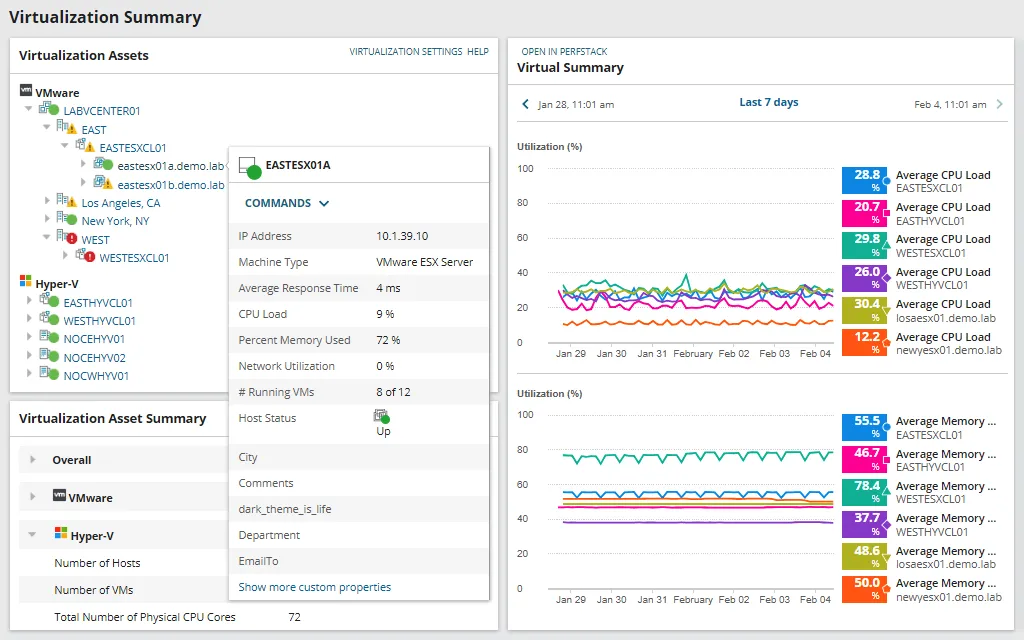
Garbage collection in Java makes memory management easier, but this process can sometimes have an impact on performance. Because garbage collection is performed in the background while the application is running and cleans unnecessary objects from memory. This mechanism can sometimes cause performance drops such as "stop-the-world" in large and complex applications. There are different garbage collection algorithms in Java to optimize the garbage collection process, but there may still be some loss of control in memory management.
Java's garbage collection process increases the security of the application and prevents memory leaks. Memory leaks are a significant problem in software applications, and application performance can be negatively affected due to developers' incorrect memory management. Java prevents such errors to a great extent with the mechanisms it has developed for garbage collection and memory management. However, completely automatic memory management can lead to a loss of flexibility in some advanced usage scenarios.
C# and Advanced Memory Management
C# has a garbage collection mechanism like Java, but the language also offers more advanced memory management features such as manual memory management and unsafe code writing. While garbage collection with the .NET Framework makes memory management easier for the user, the unsafe code usage offered by C# provides more control over memory. In C#, developers can use pointers to directly access specific memory regions and manage memory manually. This can be especially useful in performance-critical applications, as it can reduce memory usage and make certain operations faster.
C# can also directly control where value types are located in memory using struct types. This further increases C#'s flexibility in memory management. Developers can create more efficient and customized solutions for memory management by providing more granular control over the stack and heap. However, using such advanced memory management requires careful coding, as mismanaged memory can lead to memory leaks and program crashes.
Performance Differences and Advantages of C#
Performance differences between Java and C# are often tied to specific scenarios and types of applications. C# is generally faster, especially when running in Windows environments. This is due to C#’s integration with the .NET runtime and deeper integration with the Windows operating system. Additionally, C#’s lower-level memory management and fewer abstractions can provide performance advantages.
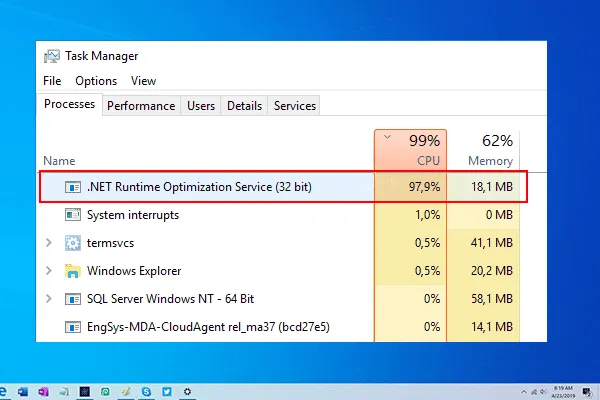
On the other hand, Java is generally known as a more platform-independent language and since it runs on the JVM, it generally performs the same on every platform. However, the extra abstractions and garbage collection processes of the JVM can be slower than C# in some cases. C#'s native code support provides a distinct advantage, especially in scenarios where application performance is critical (e.g. game development and real-time applications).
In summary, C# offers faster and more flexible memory management, while Java offers a more secure and portable solution for garbage collection and memory management. C#'s advanced memory management options and performance advantages may make it more preferred, especially in critical applications.
User Community and Ecosystem
Java's Large Community and Ecosystem
Java has been playing a significant role in the software development world since the early 1990s and has gained a large user base over time. This long-standing strong community has helped make Java one of the most popular programming languages worldwide today. The long-standing reliability provided by Java has contributed to its widespread acceptance in the software world.
One of the biggest advantages of Java is its extensive library and framework ecosystem. Java developers can use comprehensive libraries and frameworks for web development, data processing, big data solutions, mobile application development and much more. For example, popular frameworks such as Spring and Hibernate offer extensive support, especially for enterprise application development and web services. In addition, the fact that Java is the main language for Android development makes it a strong choice for mobile application development.
Java has an important place especially in areas such as financial sector and big data. Java's robust structure, security and high efficiency make it an ideal choice for financial applications and banking systems. In addition, Java's popularity is also evident in big data tools such as Hadoop and Spark. These tools make Java indispensable in big data analytics and transaction processes. Java's strong ecosystem speeds up development processes by providing a wealth of resources and support for both beginners and experienced developers.
C# Community and Microsoft Ecosystem
Although C# does not have a strong community that can rival Java's popularity, it is quite strong within the Microsoft ecosystem. Although C# was initially designed as a language that only works on the Windows platform, today it has reached a wide user base by offering cross-platform support thanks to .NET Core. This has made C# available not only on Windows but also on other platforms such as Linux and macOS.
One of the biggest advantages of C# is its integration with Microsoft products and developer tools. Those who develop software with C# can use powerful integrated development environments (IDEs) such as Visual Studio. Visual Studio provides great convenience, especially in the debugging, refactoring and application development process. This powerful IDE makes the work of C# developers very efficient.
C# is also particularly strong in game development. The Unity game engine uses C# as the main language for game development. This makes C# very popular among independent game developers and game studios. It also holds an important place in the business applications and web development field. Frameworks such as ASP.NET and Blazor offer powerful tools for web application developers and make C# competitive in web development.
C#'s presence in the Microsoft ecosystem makes it popular in the business world. Its ability to work in perfect harmony with Microsoft technologies such as SQL Server, Azure and SharePoint is one of the main reasons why C# is preferred in large corporate projects. C#'s strong support is a very valuable tool, especially for big data analysis, cloud solutions and applications that digitize business processes.
In summary, Java has a much larger community and a strong ecosystem built over the years. C# is popular in business and game development with the advantages of Microsoft's strong ecosystem and tools. Which language to choose depends entirely on the developer's needs, work environment, and application type.
Development Tools and IDEs
Popular IDEs for Java
There are many powerful and popular Integrated Development Environments (IDEs) for Java developers. These are tools that speed up the software development process, make it easier to detect errors, and make managing code more efficient. The most preferred IDEs for Java include IntelliJ IDEA, Eclipse, and NetBeans. Each of them offers users different features and advantages in the Java development process.
- IntelliJ IDEA: In the Java development world, IntelliJ IDEA stands out especially with its advanced code completion and refactoring tools. As a modern IDE, IntelliJ provides great convenience to developers with automatic error detection and fast code fixing features. In addition, IntelliJ's user-friendly interface and powerful tools increase the productivity of software developers. However, IntelliJ IDEA can sometimes run a little slower on larger projects and consume more system resources.
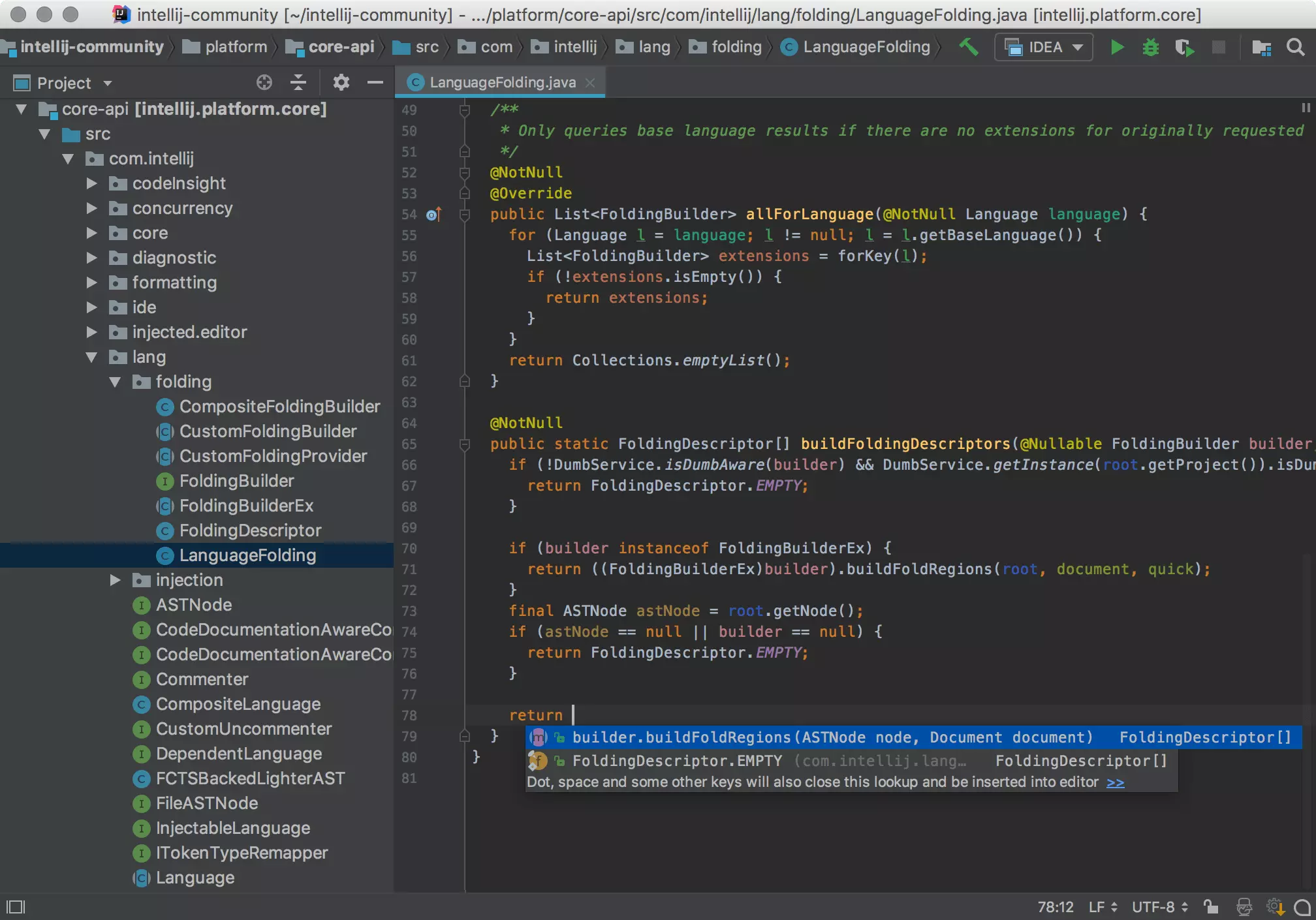
- Eclipse: Another IDE that has been popular in the Java world for many years is Eclipse. Eclipse is an open source platform and offers powerful tools and extensive plugin support for Java development. Eclipse can be an excellent choice for managing large projects, but some users may note that it has a rather heavy and complex interface at times. However, when configured correctly, it provides a very productive development environment.
- NetBeans: NetBeans is an ideal choice especially for beginner developers. It stands out with its user-friendly interface, lightweight structure and easy learning. NetBeans provides effective results especially in small and medium-sized Java projects. However, you may experience performance problems in larger projects. Although NetBeans does not have as many features as IntelliJ and Eclipse, it offers sufficient tools for rapid development of Java projects.
Java IDEs can sometimes be slower despite their powerful features. In large projects, there can be a lot of memory consumption and processor load. This may cause some Java developers to look for faster alternatives. However, Java's most popular IDEs offer powerful tools and functionality to developers of all levels, allowing them to effectively use the power of the language.
The Power of C# and Visual Studio
The most powerful development tool for C# developers is undoubtedly Visual Studio. This IDE offered by Microsoft is designed to be fully compatible with the advanced features of C# and offers excellent support especially for large projects. Visual Studio provides a number of superior features and tools for C# developers, making the software development process more efficient.
- Debugging: One of the most powerful features of Visual Studio is its advanced debugging tools. C# developers can instantly test their codes and quickly solve problems thanks to Visual Studio's powerful debugging features. In addition to following the code flow, the Debugger is an extremely effective tool in detecting all kinds of errors and memory errors. This feature provides a great advantage, especially in complex software.
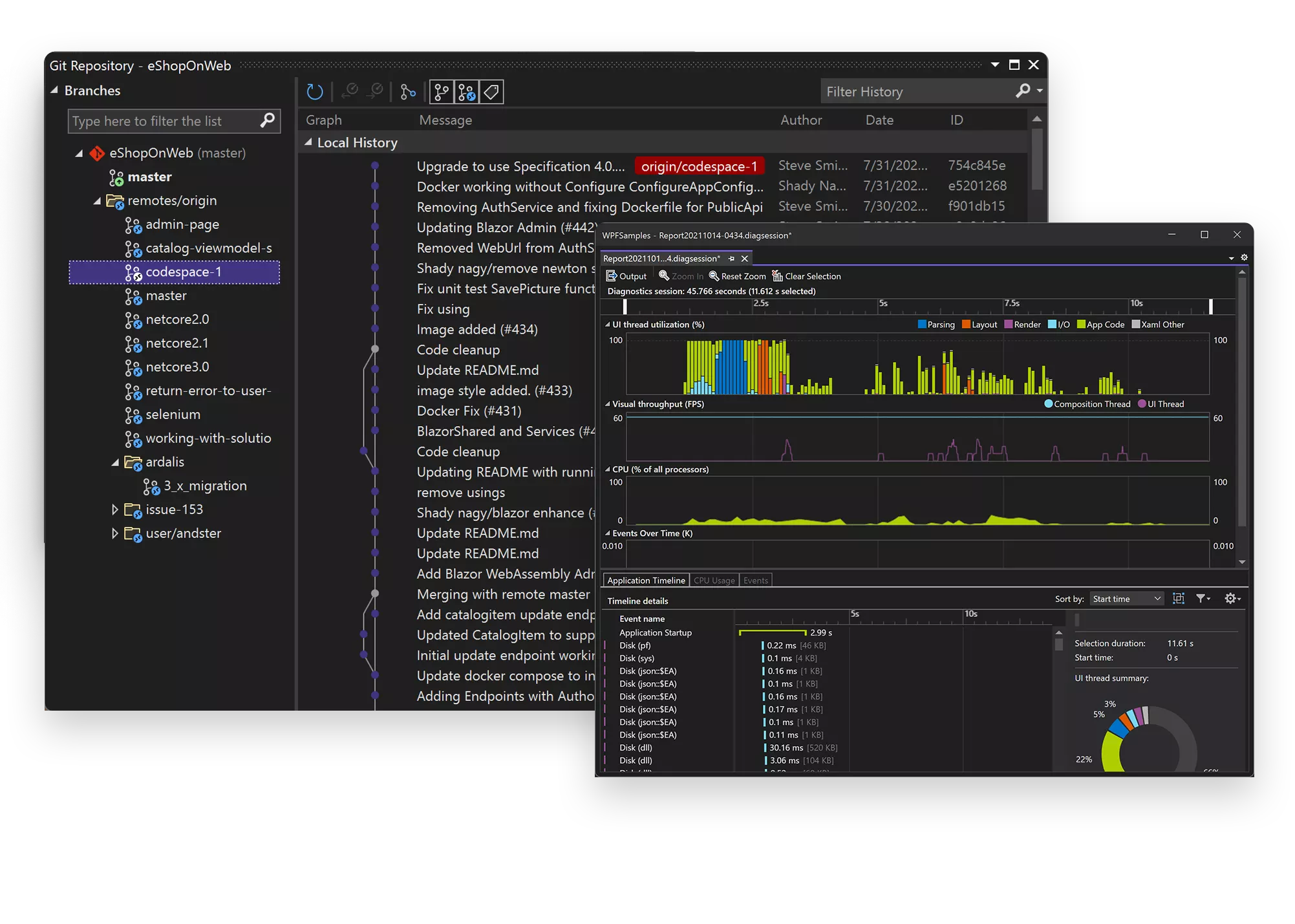
- Code Refactoring and Code Completion: Visual Studio offers tools that make refactoring (restructuring) operations easier and make code more readable. In addition, features such as code completion and intellisense make the software development process faster and error-free. C# developers can increase the quality of the software and minimize errors by taking advantage of the automatic code editing features offered by Visual Studio.
- Efficient Development Process: Visual Studio also stands out with its multi-platform support and cross-platform development tools. Compatible with popular frameworks such as ASP.NET, Xamarin and Unity, Visual Studio offers C# developers not only desktop applications but also mobile and game development opportunities. This allows C# developers to develop applications for different platforms from a single IDE.
Visual Studio's performance and features provide significant benefits, especially in large projects. However, there are some difficulties such as Visual Studio's installation time and consuming more system resources. However, the advanced tools and high efficiency it provides usually compensate for these difficulties.
As a result, although Java IDEs are generally more diverse and offer more options, Visual Studio is one step ahead for C# developers. Especially the strong integration of C# and the efficient debugging and code editing features of Visual Studio allow C# developers to do their jobs faster and easier. In the choice between these two languages, different preferences can be made depending on the user's development environment, the scale of their projects and the frameworks used.
Application Areas and Use Cases
Popular Areas of Use of Java
Java has been a very widely used programming language in the software development world for years and has a wide range of uses. Initially used only for desktop and server-side applications, Java has gained a strong place in many different areas such as web applications, mobile applications and big data processing over time. Some of the popular areas of use of Java can be listed as follows:
- Web Development: Java is very popular in developing enterprise-level web applications, especially thanks to powerful frameworks such as Spring and Hibernate. Tools such as Spring MVC have made Java a preferred language for developers developing reliable and scalable web solutions. Java-based web frameworks provide great advantages in large-scale applications, high-traffic and security-required projects.
- Android Applications: Java has historically been the primary language of the Android platform. Android SDK is developed based on Java, so Java is an important tool for developers who develop Android applications. Although Java has taken a back seat in Android development with the popularization of Kotlin, it is still preferred by a large audience.
- Big Data Processing: Java is considered an important language in the world of big data processing. Big data processing platforms such as Hadoop and Apache Spark are compatible with Java, and Java provides a powerful infrastructure for data processing, analysis, and distributed systems. In addition, Java's robust infrastructure offers a very effective solution to ensure security and efficiency in high-volume data applications.
- Enterprise Solutions: Java is very strong in enterprise software development, and tools such as Java Enterprise Edition (JEE), EJB (Enterprise JavaBeans) and JPA (Java Persistence API) are widely used in the development of large and complex enterprise systems. Java is a safe choice for large organizations with its stability and long-term support.
Java’s wide range of use and strong ecosystem make it a preferred language in many sectors. It is used effectively in many areas, from corporate solutions to mobile applications. In addition, with its constantly updated libraries and frameworks, it offers software developers a wide range of work opportunities.
Areas of Use and Advantages of C#
C# is a programming language developed by Microsoft and used especially in integration with the .NET platform. Although it was initially designed to be used only on the Windows platform, today it has greatly expanded the areas of use of C by offering cross-platform support thanks to .NET Core. Here are some areas of use where C# is strong:
- Windows Applications: One of the most common areas of use of C# is to develop Windows desktop applications. Tools such as Windows Forms and WPF (Windows Presentation Foundation) have made C# ideal for desktop applications. Thanks to these tools, developers can quickly and effectively create desktop applications with user-friendly interfaces.
- Game Development (Unity): Perhaps one of the most notable areas of use of C# is game development with the Unity game engine. Unity is a popular game engine that makes game development easier and is used by millions of developers worldwide. Unity is fully compatible with C#, making it a great choice for game developers. In-game logic and interactions are often written using C#, making it a powerful tool in the gaming world.
- Web Development (ASP.NET): Another area where C# is strong is web development. ASP.NET is a widely used framework for creating dynamic websites and web applications. ASP.NET, combined with the efficiency and powerful features offered by C#, enables fast, secure, and scalable web application development. In addition, with ASP.NET Core, C# now offers cross-platform support, making web development possible on systems such as Linux and macOS.
- Modern Web Technologies: C#, especially with modern web technologies such as Blazor, enables the development of applications that run in the browser using WebAssembly. This technology allows C# developers to develop web applications using C# instead of JavaScript. The integration of C# with modern web technologies increases the language's potential in web development.
- Cloud-Based Applications and Azure: C# is perfectly compatible with Microsoft's cloud platform Azure. Azure makes C# a powerful cloud development language, especially with services such as Azure Functions and Azure Web Apps. Applications developed with C# can efficiently meet cloud-based solutions and data storage needs.
- Database Applications: C# has excellent integration with Microsoft's data management systems such as SQL Server. This feature makes C# a popular choice for developers who develop database applications. Powerful and efficient database applications can be developed with C#.
These areas where C# is strong show how flexible and versatile the language is in software development. Its use in game development, desktop applications, web development and cloud-based systems in particular makes C# an ideal language for a wide variety of projects. The modern features offered by C# provide developers with a more efficient software development process and give them an advantage in a competitive software world.
Performance and Speed Comparison
Java’s Performance
Java generally offers sufficient speed in terms of performance, but in some cases it may perform less than C#. Java’s performance characteristics are largely determined by the Java Virtual Machine (JVM) and the Just-In-Time (JIT) compiler. The JVM converts Java code into bytes (bytecode) before executing it and then executes these bytecodes. This process is quite effective in ensuring Java’s platform independence, but in some scenarios this additional layer can lead to performance loss compared to C#.
- JVM’s Role and Speed: The JVM enables Java to work with the “Write Once, Run Anywhere” philosophy. Thanks to this, Java can run the same code on different platforms. However, this platform independence advantage can make it a bit difficult to do certain optimizations, and as a result, Java applications can sometimes run slower than C#. JVM adds overhead at runtime, which can sometimes slow down performance.
- JIT Compiler: Java's JIT compiler translates code into native machine language at runtime, which attempts to speed up the application. However, this compilation process can also take time and can result in slightly more latency when starting the application. This can be a disadvantage, especially for short-running applications or high-performance operations.
- Lower Performance Cases: Java can perform well in large, complex applications. However, it may be less efficient in some computational operations and memory management compared to C#. Also, Java's slightly higher memory consumption can affect performance.
Performance Advantages of C#
C# generally runs faster in terms of performance, especially on the Windows platform. The main reason for this is that C# is integrated with powerful operating environments such as .NET Framework and .NET Core and its native compilation capabilities stand out. The performance advantages offered by C# can be summarized as follows:
- Speed on Windows Platform: C#'s integration with .NET Framework and .NET Core makes it very fast and efficient, especially in the Windows environment. C# applications that are fully compatible with the Windows operating system start faster and can run with lower latency compared to Java applications managed by the JVM. Direct translation of C# into machine language contributes greatly to the application's speed.
- Native Compilation and .NET Core: With .NET Core and .NET 5+, C# now offers more cross-platform support and provides significant improvements in speed on platforms other than Windows. Ahead-Of-Time (AOT) compilation enables C# applications to start up and run faster. Compared to Java's JVM-based execution method, C#'s AOT compilation advantage offers more efficient memory management and processing speed.
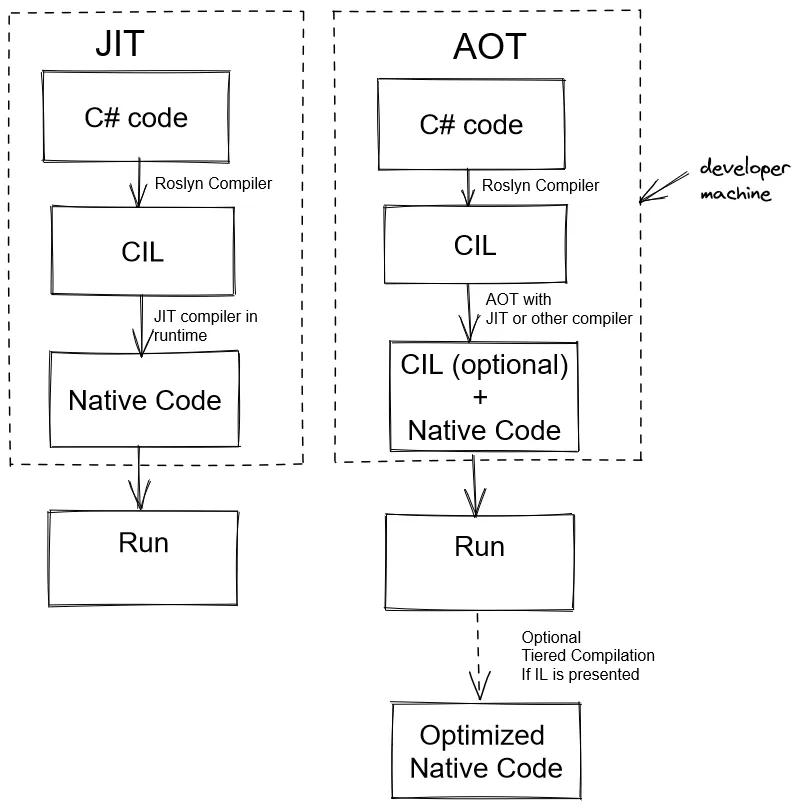
- Practical Impact of Performance Differences: The performance difference between C# and Java often depends on the nature and requirements of the application. In general, there may be minor performance losses due to Java's JVM and JIT compiler, while C#'s native compilation and platform-specific optimizations usually provide faster results. However, both languages offer similar performance levels in most cases. That is, depending on the type of application and the tools used, this difference may not be very large in practice. However, C# is usually a step ahead in performance-critical applications.
Conclusion
While both languages have solid performance characteristics, C# is generally faster on the Windows platform because of native compilation and platform-specific optimizations. Java, on the other hand, offers greater platform independence, but this can sometimes lead to performance losses. As a result, the performance differences may not be noticeable for most modern software, but C# can be advantageous for large-scale, performance-demanding projects.
Entry Level and Learning Curve
Learning Java and Beginner Difficulties
Java is generally considered a very suitable language for beginners to learn. Java, which has a simple and understandable structure, is an ideal starting language for those who want to learn object-oriented programming (OOP) concepts. Java's syntax is generally intuitive and can be easily understood by programmers.
- Simplicity and Portability: Java's simplicity makes it attractive to beginner developers. The language avoids unnecessary complexity and has a clean structure. In Java, working with objects and classes is enough to learn basic concepts and is often preferred as the first language to start learning OOP. Java's "Write Once, Run Anywhere" philosophy also provides an advantage for developers, because once the code is written, it can run on different platforms. This increases the flexibility and portability of the language.
- Less Flexibility: However, Java’s minimalist nature can sometimes make it limited when compared to more flexible languages. Especially when considering the modern software development paradigm and requirements, you may notice that Java lacks some modern features (e.g. LINQ, async/await). This may be enough for beginners who are not familiar with the advanced features of the language, but as you start to expand your software development practice, the lack of flexibility can become apparent.
- Challenges and Learning Curve: Java is a less flexible language, which can make it a bit difficult to transition to some advanced programming paradigms or new features. But beyond that, Java’s learning curve is generally slow and steady, which is a big advantage for beginners to progress. For example, it is possible to start with a simple “Hello World” application and move on to more complex projects over time.
C#’s Learning Curve and Modern Features
C# is considered a language that is closer to modern software development paradigms. However, this can create some difficulties for beginners because the language offers richer and more complex features.
- Rich Feature Set and Initial Difficulties: C#’s language features include modern software paradigms such as LINQ, async/await, delegates, events, properties. This can make the language difficult to learn at first, because these features may seem complex at first for beginners. However, those who understand the basics of software development can quickly adopt the rich features of C#. In addition, those who are familiar with modern software practices can learn C# faster, which makes learning the language easier.
- More Complex Learning Process: The advanced features offered by C# can cause some difficulties at first. Especially understanding structures such as delegates, events and LINQ can be confusing for beginners at first. Therefore, when learning the C# language, it is necessary to move on to more complex features after mastering the basic structures of the language.
- Ease for Those Familiar with Modern Software Development Concepts: C# may be a more natural choice for those who have experience in modern software development practices. Because C# has integrated with asynchronous programming, new generation data structures and advanced methods over time. Therefore, those who have experience in software development can progress faster in taking advantage of C#'s advanced features, especially compared to Java. C#'s cross-platform support, especially with .NET Core, is quite suitable for meeting modern software development needs.
Conclusion
While Java is a very suitable language for beginner developers, C# may be a little more challenging at first because it provides a richer feature set and compliance with the modern software paradigm. While Java is a good language for beginners thanks to its simplicity and portability, the flexibility and modern features offered by C# can take software development practice a step further.
Conclusion and Which Language to Choose?
Java and C# are the two most preferred programming languages in the software world. Although both languages have strong communities, large ecosystems and long-term development processes, each has its own advantages and areas of use. So, Java or C#? Which language should be preferred in which case?
Java or C#? Which One Should Be Preferred in Which Situation?
Advantages of Java and Suitable Situations:
- Platform Independence: One of the biggest advantages of Java is platform independence. Thanks to the "Write Once, Run Anywhere" philosophy, applications written in Java can be run on any device. This feature makes Java a perfect choice for projects that require multi-platform support.
- Wide Ecosystem and Library Support: Java offers a large number of libraries and frameworks, with the advantages of being a language used for many years. With powerful libraries such as Spring, Hibernate, Apache, the application development process becomes much faster and more efficient. For this reason, Java is preferred especially in corporate solutions, web development and big data processing projects.
- Android Application Development: Java still has an important place in Android application development. The fact that Android's base language is Java makes this language attractive for mobile application developers. However, with the increasing popularity of Kotlin, Java's role in this area may decrease over time.
Advantages and Suitable Situations of C#:
- Integration with Microsoft Ecosystem: C# is the base language of Microsoft's .NET platform. This gives C# a strong advantage in areas such as Windows applications, business applications, web development (ASP.NET) and database solutions (SQL Server). If a project is based on Microsoft technologies, C# may be a more suitable choice.
- Cross-Platform Development: Thanks to .NET Core, C# can now run not only on Windows, but also on Linux and macOS. It is also possible to develop iOS, Android and Windows applications using a single code base with Xamarin. This makes C# particularly attractive for cross-platform mobile development.
- Modern Programming Features: C# is enriched with modern features such as LINQ, async/await, lambda expressions. These features allow for cleaner and more efficient code writing. In addition, C#, as a more flexible language, can help software developers produce higher quality code in less time.
Which Language Should Be Preferred in Which Scenario?
- Enterprise Applications and Big Data: If the targeted application will serve a large corporate structure and host a large number of users, Java will generally be a more robust option. Java's strong infrastructure, big data processing capabilities, and security features make it an ideal language for financial services, e-commerce, and big data projects.
- Windows-Based Solutions and Business Applications: If the application to be developed will run on the Windows operating system, C# will be more suitable. C# is preferred for developing powerful desktop applications, especially with Windows Forms and WPF (Windows Presentation Foundation).
- Cross-Platform Mobile Applications: If the goal is to develop cross-platform mobile applications, C# and Xamarin offer a perfect solution. It is possible to develop Android, iOS and Windows applications simultaneously with a single C# codebase. Although Java is still popular in Android development, with the emergence of Kotlin, Java's role in this area is gradually decreasing.
- Web Applications: In terms of web development, both languages are strong. Java's Spring framework and C#'s ASP.NET platform offer robust and efficient web solutions. Here, factors such as technological preferences, ecosystem fit and organization's preference will come into play.
Best Choice According to Target Audience Needs
In conclusion, the answer to the question Java or C#? largely depends on your project requirements and your technological infrastructure. If your goal is cross-platform compatibility and multi-device support, C# and Xamarin can be a great choice. On the other hand, in areas such as Android app development or big data processing, Java's powerful libraries and platform independence will come into play.
Both languages are powerful and have established themselves in the modern software development world. To make the right choice, you should consider the specifics of your project, target platforms, team experience, and future maintenance needs.
“Writing is seeing the future.” Paul Valéry


